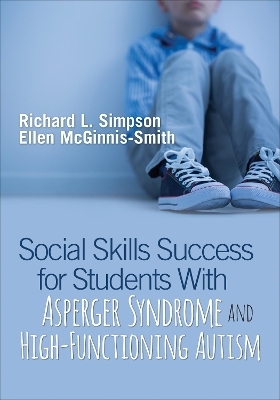
Social Skills Success for Students With Asperger Syndrome and High-Functioning Autism
Corwin Press Inc (Verlag)
978-1-5443-2050-2 (ISBN)
Provide students the social skills instruction they need to succeed in school and in life!
Students on the autism spectrum have so much to offer our schools and communities, but they often aren’t provided with sufficient opportunity to develop to their full potential. This practical resource offers down-to-earth methods and strategies backed by evidence for enhancing the social skills of children and adolescents who have Asperger Disorder and other forms of high-functioning autism. Case studies, vignettes, classroom materials, checklists, and templates will help you:
Deliver interventions that model desirable behaviors and provide opportunities for students to practice
Support students in navigating social situations, forming relationships with peers and adults, and following rules and routines
Develop, implement, and evaluate social skills intervention and support programs
Educators and specialists will appreciate how this practical and friendly resource approaches each student as a unique learner and offers ways to build multi-faceted social skill intervention and support plans for each one.
"Packed with practical, research-based activities, this book is the answer for teachers and parents. Educators will find value in the detailed processes and activities as well as the ready-to-use materials."
—Renee Bernhardt, Supervisor of Special Education
Cherokee County School District, Canton, GA
"This is an up-to-date, practical, and practitioner-friendly resource for developing, implementing, and evaluating social skill intervention and support programs."
—Debi Gartland, Professor of Special Education
Towson University
Richard L. Simpson was Professor Emeritus at the University of Kansas. He was a member of the Department of Special Education faculty for over 40 years. While at the University of Kansas he directed numerous University of Kansas and University of Kansas Medical Center demonstration programs for students with autism spectrum disorders and other disabilities and coordinated a variety of federal grant programs related to students with autism spectrum disorders and other disabilities. He also worked as a special education teacher, school psychologist and coordinator of a community mental health outreach program. Rich authored numerous books, articles, and texts on a variety of topics connected to students with disabilities. Rich was the former senior editor of the professional journal Focus on Autism and Other Developmental Disabilities. His awards include the Council for Exceptional Children Research Award, Midwest Symposium for Leadership in Behavior Disorders Leadership Award, Autism Society of Kansas Leadership Award, and numerous University of Kansas awards and distinguished roles, including the Gene A. Budig Endowed Teaching Professorship of Special Education. Ellen McGinnis-Smith earned her Ph.D. in Special Education at the University of Iowa and certification as a school administrator from Drake University. She has been a teacher of special education at both the elementary and secondary levels for eleven years primarily in the area of behavioral disorders. Dr. McGinnis-Smith served as an educational consultant at Child Psychiatry, University of Iowa as well as in the public schools. She was principal of Orchard Place, a residential and day treatment center, in Des Moines, Iowa for 10 years and served as Director of Special Education for Des Moines Public Schools. She recently retired as a mental health and dispute resolution consultant for the Iowa Department of Education. Dr. McGinnis-Smith is the author of the Skillstreaming social skills programs. She and her husband, Carl Smith (also a special educator), have two adult children.
Preface
Publisher’s Acknowledgments
About the Authors
Chapter 1. Understanding Asperger Syndrome and High-Functioning Autism
Autism Spectrum Disorders
Children and Youth With Asperger Disorder and Other Types of High-Functioning Autism
Social Skill and Social Interaction
Physical and Motor Skill Challenges
Case Example: Stanley
Prevalence
Summary Considerations
References
Chapter 2. Social Challenges and Foundations for Successful Outcomes
Justification for Social Skill Instruction
Challenges to Social Skill Instruction
Strategies for Teaching Social Skills to Children and Youth With HF/AD
A Foundation for Social Skill Instruction
Social Skill Instructional Targets
Summary Considerations
References
Chapter 3. Social Skill and Support Methods for Learners With Asperger Disorder and High-Functioning Autism
Fundamental Instructional Methods for Children With High-Functioning Autism
Social Skill Instructional Steps for Building Social Skill Capacity and Social Interaction Competency
Summary Considerations
References
Examples: Social Skill Instructional Targets, Skill Development Steps, and Evaluation
Chapter 4. Sample Social Skill Development Program
Case Example: Jackson
Category 1: Fundamental Social Interaction, Social Relationship, and Collaboration Skill Sample Program
Category 2: Self-Advocacy, Self-Management, and Personal Accountability Sample Program
Category 3: School-Related Social Skills Sample Program
Summary Considerations
References
Chapter 5. Generalizing Social Skills: Challenges and Strategies
Planning for Skill Generalization and Transfer
Planning for Skill Generalization: Role-Playing and Practice
Planning for Skill Generalization: Coaching and Performance Feedback
Planning for Skill Generalization: Practice and Skill Rehearsal in Everyday Settings
Summary Considerations
References
Chapter 6. Supports for Structuring, Organizing, and Managing Social Learning
Supporting and Supporting and Promoting Acquisition and Performance of New Social Skills and Developing Social Interaction Competence
Environmental Modifications and Structuring Procedures
Social Skill Instructional Support Methods
Summary Considerations
References
Chapter 7. Peer Supports
Creating a Foundation of Social Acceptance and Positive Attitudes
Positive Experiences
Peer Recruitment
Using Peers to Create and Display Appropriate Models of Target Skills
Peer Involvement in Role-Play and Practice
Peer Involvement in Coaching and Performance Feedback
Peer Involvement in Assisting Learners to Practice, Rehearse, and Generalize Social Skills in Natural Settings
Summary Considerations
References
Chapter 8. Parent and Family Involvement and Support
Communication and Collaboration
Facilitating Ongoing Communication, Information Exchange, and Collaborative Relationships
Building Partnership and Skill Development and Support Relationships With Parents and Families
Selecting Levels and Types of Parent/Family Involvement
Summary Considerations
References
Index
| Erscheinungsdatum | 11.07.2018 |
|---|---|
| Verlagsort | Thousand Oaks |
| Sprache | englisch |
| Maße | 177 x 254 mm |
| Gewicht | 450 g |
| Themenwelt | Medizin / Pharmazie ► Medizinische Fachgebiete ► Neurologie |
| Sozialwissenschaften ► Pädagogik ► Sonder-, Heil- und Förderpädagogik | |
| ISBN-10 | 1-5443-2050-7 / 1544320507 |
| ISBN-13 | 978-1-5443-2050-2 / 9781544320502 |
| Zustand | Neuware |
| Haben Sie eine Frage zum Produkt? |
aus dem Bereich


